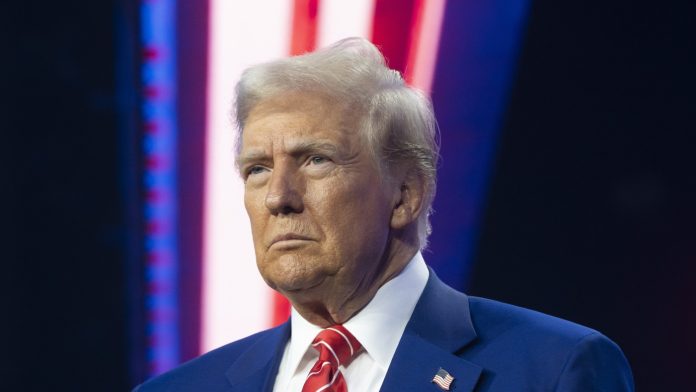President-elect Donald Trump looks on during Turning Point USA’s AmericaFest at the Phoenix Convention Center in December 2024 in Phoenix, Ariz.
Rebecca Noble/Getty Images
hide caption
toggle caption
Rebecca Noble/Getty Images
President-elect Donald Trump received an unconditional discharge for his criminal conviction in New York on Friday, meaning he will not face fines, prison, or any other penalties.
The former and future president appeared virtually in a Manhattan courtroom on Friday for his sentencing on 34 felony counts of falsifying business records to conceal a payment to an adult film star.
During the brief hearing, New York state Judge Juan Merchan said the only lawful sentence that does not encroach on the office of the president is that of an unconditional discharge on all counts.
The 2024 election results loomed over the hearing, with Trump just 10 days away from being sworn into the oval office for a second term. Trump had argued the sentencing would interfere with his ability to govern, and said he plans to appeal.
This was the first time that a former, future or sitting U.S. president has been tried on criminal charges. And this was the only one of Trump’s criminal cases to see trial.

“Trial was a paradox,” Merchan said, noting the high level of security and media attention. But “once doors closed, it was no more unique than the other 32 trials taking place in this courthouse at the same exact time.”
But while the trial could be seen as an ordinary procedure, Merchan said, the same cannot be said about the circumstances surrounding the sentencing because Trump is about to occupy the office of the president.
“Sir, I wish you Godspeed as you assume your second term in office,” Merchan said before leaving the bench.
Prosecutors asked for minimal sentence
Trump on Thursday exhausted his last legal maneuver to stop the sentencing, after a narrow majority of Supreme Court justices declined to intervene.
Prosecutors in the office of Manhattan District Attorney Alvin Bragg recommended that Trump get the minimal sentence of unconditional discharge, as a way to ensure the trial’s finality and respect the jury’s verdict, while not interfering with Trump’s ability to govern.
An “unconditional discharge” means the president-elect must do nothing, but the conviction will remain on his record.
Right before being formally sentenced, Merchan offered Trump the opportunity to speak. During his remarks, Trump doubled down on his defense: that the business records were legal expenses, not hush-money payments, and recorded by accountants, not by him.
“I would just like to explain that I was treated very, very unfairly,” Trump said, after reiterating the false claim that the trial is politically motivated, and arguing that he is innocent despite the jury conviction.

Prosecutors pushed back against Trump’s attempts to characterize the trial as politically motivated.
“The defendant’s conduct constitutes a direct attack on the rule of law itself,” said Josh Steinglass, one of the prosecutors. “This defendant has caused enduring damage to the public perception of the criminal justice system and has placed officers and court in harm’s way.”
Since Trump’s conviction in May, Merchan has postponed the sentencing several times, including to avoid any perception of political bias ahead of Election Day, and then to allow Trump to argue he had immunity in the case, based on a Supreme Court ruling on presidential immunity.
Merchan ultimately denied the immunity claims, and the dismissal, paving the way for the hearing on Friday.
Anna Cominsky, director of the criminal defense clinic at New York Law School, said the sentence does give the public a measure of closure about the case — even as the planned appeals could stretch on for years.
“It certainly makes sense that there be some finality to this case because as a nation, we should want to move on, in particular as he assumes the role of president, and be able to look forward to the next four years without this sentence pending,” Cominsky said. “There has to be an end.”




